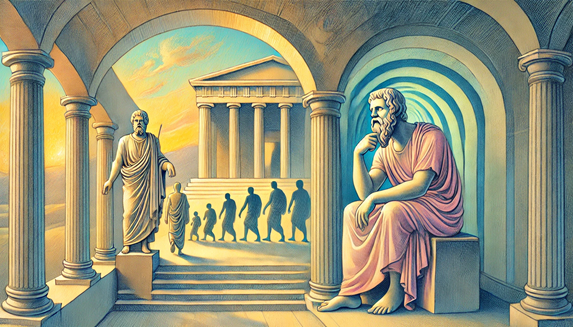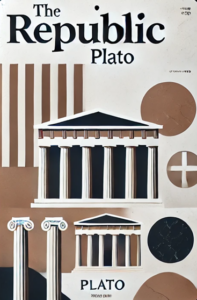SUMMARY
- Explores the nature of justice and the characteristics of a just society and individual through dialogues primarily featuring Socrates.
- Introduces the concept of philosopher-kings, advocating for rulers guided by wisdom and rationality rather than power and wealth.
- Examines the tripartite structure of society, divided into producers, auxiliaries, and guardians, each of which contributes to societal harmony.
- Presents the allegory of the cave, illustrating the philosopher’s journey from ignorance to enlightenment and emphasising the pursuit of knowledge.
- Highlights the importance of education in cultivating virtues necessary for just governance and personal fulfilment within an ideal society.
REVIEW
The Republic, authored by Plato around 375 BC, is a foundational text in Western philosophy and political theory. Through dialogues primarily featuring Socrates, Plato explores profound questions about justice, governance, and the ideal society. This work remains a cornerstone in understanding philosophical and political concepts that continue to influence contemporary thought.
The Republic is structured as a Socratic dialogue that explores the nature of justice and the characteristics of a just society and an individual. Socrates engages with various Athenians to dissect the meaning of justice, ultimately questioning whether a just person leads a happier life than an unjust one. The dialogue presents a vision of an ideal society divided into three classes: producers, auxiliaries, and guardians, each contributing to the state’s harmony and functionality. This exploration of societal structure and individual morality has had a lasting impact, prompting readers to reflect on the principles of justice and the role of individuals within a community.
Plato’s work has profoundly influenced Western thought by introducing the concept of philosopher-kings —rulers guided by wisdom and rationality, rather than power and wealth. This idea challenges traditional governance models and suggests that those who govern should have a deep understanding of truth and justice. The allegory of the cave, one of the most famous sections of the dialogue, metaphorically illustrates the philosopher’s journey from ignorance to enlightenment, emphasising the importance of knowledge and the pursuit of truth. These concepts have sparked ongoing discussions about the nature of reality and the ideal state, making The Republic a timeless piece of philosophical literature.
The Republic covers several key concepts, including the theory of forms, which posits that the material world is a shadow of a higher reality composed of unchanging, perfect forms. This theory underpins Plato’s argument for the philosopher-king, as only those who understand these forms can truly grasp the essence of justice and govern effectively. Additionally, the dialogue examines the tripartite nature of the soul, aligning it with the three classes of society, and argues that a balanced soul leads to a just life.
Another significant concept is the role of education in achieving a just society. Plato emphasises educating the guardians, or future rulers, to ensure they develop the virtues necessary for wise and just governance. This focus on education highlights the belief that knowledge and virtue are essential for both personal fulfilment and societal harmony. Addressing these themes, The Republic offers a comprehensive vision of an ideal society and the philosophical underpinnings necessary to achieve it.
The Republic’s enduring relevance and ability to provoke thought and discussion across centuries make it special. Plato’s exploration of justice, governance, and the nature of reality challenges readers to consider the foundations of their own beliefs and the structures of their societies. The dialogue’s rich philosophical insights and innovative ideas continue to inspire and influence thinkers, making it a timeless masterpiece in the Western philosophical canon.

CHARACTERS
Socrates: The main character and philosopher who leads the dialogue, questioning the nature of justice and the ideal state.
Glaucon: Plato’s brother, who challenges Socrates to defend the idea of justice and plays a key role in the discussions.
Adeimantus: Another of Plato’s brothers, who supports Glaucon and seeks to understand the implications of justice for the individual.
Thrasymachus: A sophist who argues that justice is the advantage of the stronger, opposing Socrates’ views on morality and justice.
Polemarchus: The son of Cephalus, who initially defines justice as helping friends and harming enemies, engages in debate with Socrates.
Cephalus: An elderly, wealthy man who discusses the nature of old age and justice, providing a starting point for the dialogue.
Glaucon’s and Adeimantus’ fathers: Mentioned in the context of their upbringing and philosophical education, which influenced their perspectives.
The Guardians: A class of rulers in Plato’s ideal city-state, representing the philosopher-kings who govern with wisdom and justice.
The Auxiliaries: The warrior class in the ideal city-state, responsible for protecting the city and enforcing the laws established by the Guardians.
The Producers: In the ideal city-state, the working class is responsible for producing the goods and services necessary for society’s survival.
LOCATIONS
Athens: The city-state where Socrates and his interlocutors engage in philosophical discussions about justice and the ideal society. Modern location: Athens, Greece.
Kallikrates: The ideal city, emphasising society’s importance of harmony and order. Modern location: N/A (fictional representation).
Piraeus: The port of Athens, symbolising the connection between the city and the outside world and the importance of trade and commerce. Modern location: Piraeus, Greece.
Thessaly: Mentioned as a region known for its horse breeding, representing the importance of physical prowess in the ideal society—modern location: Thessaly, Greece.
Syracuse: A city in Sicily referenced in discussions about governance and the nature of power. Modern location: Syracuse, Italy.
Megara: A city-state known for its philosophical schools, contributing to the dialogue on ethics and justice. Modern location: Megara, Greece.
Corinth – A wealthy city-state that serves as an example of the consequences of unjust governance. Modern location: Corinth, Greece.
Sparta: Known for its militaristic society, often contrasted with the philosophical ideals presented in The Republic. Modern location: Sparta, Greece.
Delphi: The site of the Oracle, representing the pursuit of knowledge and truth in governance. Modern location: Delphi, Greece.
Aegina: A rival city-state to Athens, illustrating the ideal society’s conflicts and challenges. Modern location: Aegina, Greece.
IMPROVES
- Creativity and Imagination: Reading Plato can inspire innovative thinking and new ideas through philosophical exploration.
- Analytical Thinking: Engaging with Plato’s arguments enhances critical reasoning and the ability to analyse complex concepts.
- Empathy: Understanding diverse philosophical perspectives fosters greater empathy towards others’ viewpoints and experiences.
- Self-awareness: Plato’s discussions encourage introspection, helping readers understand their beliefs and values.
- Democratic Values: His works promote discussions on justice, governance, and the role of citizens, reinforcing the importance of democratic principles.

